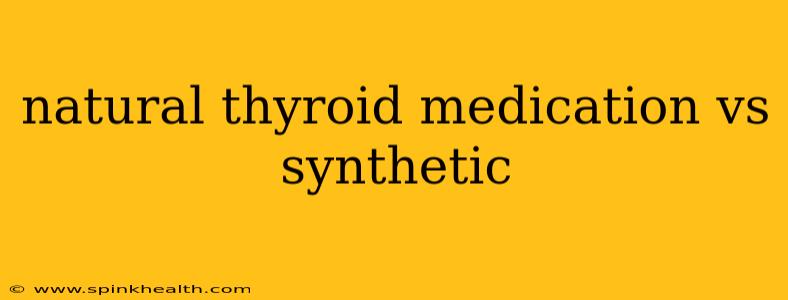Natural Thyroid Medication vs. Synthetic: Unveiling the Truth Behind Hormone Replacement
The thyroid, a small butterfly-shaped gland nestled in your neck, plays a pivotal role in your body's overall health. It produces hormones that regulate metabolism, impacting everything from your energy levels to your weight and mood. When your thyroid underperforms (hypothyroidism), doctors often prescribe medication to supplement the missing hormones. But here lies a common question: Natural thyroid medication vs. synthetic – which is better? This isn't a simple "one size fits all" answer, and the journey to finding the right treatment is often a personal one. Let's explore the nuances.
What are Natural and Synthetic Thyroid Hormones?
Before diving into the comparison, let's clarify what we're talking about.
-
Synthetic thyroid hormone: This is the most common type of thyroid medication prescribed. Levothyroxine (LevoT, Synthroid, others) is the most prevalent synthetic version of T4 (thyroxine), the main thyroid hormone. Some formulations also include liothyronine (T3, Cytomel), another thyroid hormone, but less frequently as a solo treatment. Synthetic hormones are made in a laboratory, meticulously replicating the structure of natural thyroid hormones.
-
Natural desiccated thyroid (NDT): This comes from the dried thyroid glands of pigs. It contains a mixture of T4 and T3, as well as other thyroid hormones found naturally in the gland. Brands like Armour Thyroid and Nature-Throid are common examples. The composition can vary slightly between batches depending on the source material.
What are the Differences Between Natural and Synthetic Thyroid Medications?
The core difference boils down to the composition and processing. Synthetic hormones are pure and precisely dosed, while NDT contains a blend of hormones with some variation. This difference impacts several aspects of treatment:
-
T3 and T4 Levels: Synthetic levothyroxine (T4) is primarily prescribed. The body then converts T4 to T3, which is the more active hormone. Some individuals find that this conversion process is inefficient. NDT provides both T4 and T3 directly, potentially offering a benefit for people who struggle with T4 to T3 conversion.
-
Dosage Consistency: Synthetic hormones have consistent dosage across batches, making monitoring thyroid levels and adjusting medication simpler. NDT dosage can vary slightly, requiring more careful monitoring and potential adjustments.
-
Other Compounds: NDT contains other compounds found naturally in the thyroid gland beyond T3 and T4. The impact of these compounds is still being researched, and some believe they might play a role in the overall effectiveness of NDT.
-
Cost: Often, synthetic levothyroxine is more affordable than NDT.
What are the Advantages of Natural Desiccated Thyroid?
Some patients report feeling better on NDT, experiencing improved energy levels, mood, and weight management compared to synthetic levothyroxine. They often attribute this to the presence of T3 and the other natural compounds in the NDT.
-
Improved Symptom Relief: Many patients report improved symptoms, including fatigue, weight gain, brain fog, and depression, suggesting a better metabolic response.
-
Direct T3 Provision: The presence of T3 eliminates the body's conversion process, which can be problematic for some individuals.
What are the Disadvantages of Natural Desiccated Thyroid?
Despite potential benefits, NDT does present certain drawbacks:
-
Dosage Variability: The inconsistent composition between batches means the dosage of T3 and T4 can fluctuate. This requires more frequent blood testing to ensure optimal levels and potential dosage adjustments.
-
Potential for Side Effects: Because NDT contains more than just T3 and T4, there is a greater potential for side effects from other compounds in the extract.
-
Less Predictable Response: Due to the variability of the content, the clinical response can vary from batch to batch.
Which is Better for Me: Natural or Synthetic Thyroid Medication?
The decision between natural and synthetic thyroid medication isn't one to make lightly. It's a collaborative discussion between you and your endocrinologist. Your doctor will consider several factors, including your specific symptoms, the severity of your hypothyroidism, and your response to treatment. They will likely start with synthetic levothyroxine because of its well-established efficacy and consistent dosage. If you experience persistent symptoms despite adequate levothyroxine levels, they may then consider NDT.
What are the Side Effects of Natural Thyroid Medication?
Side effects of NDT can be similar to those of synthetic thyroid medication, but there’s a higher potential for variations due to the presence of additional compounds. Common side effects can include:
- Heart palpitations: An increased heart rate.
- Anxiety: Feeling of nervousness and unease.
- Insomnia: Difficulty sleeping.
- Tremors: Involuntary shaking.
- Weight loss: Often unintended, and potentially extreme.
It's critical to report any unexpected side effects to your doctor immediately.
How is Natural Thyroid Medication Prescribed and Monitored?
NDT is prescribed and monitored similarly to synthetic levothyroxine, but it requires closer attention to dosage and potential adjustments because of its inherent variability. Your doctor will likely conduct regular blood tests to check your TSH (thyroid-stimulating hormone), free T4, and free T3 levels to optimize your treatment.
Can I Switch From Synthetic to Natural Thyroid Medication?
Switching between synthetic and natural thyroid medication requires careful medical supervision. It's not something to attempt independently. Your doctor will need to monitor your hormone levels closely during the transition to ensure a smooth and safe shift.
In conclusion, the choice between natural and synthetic thyroid medication is highly individualized. There's no universally "better" option. Open communication with your endocrinologist, regular blood testing, and close monitoring are crucial to finding the right treatment that best suits your needs and helps you manage your hypothyroidism effectively.

